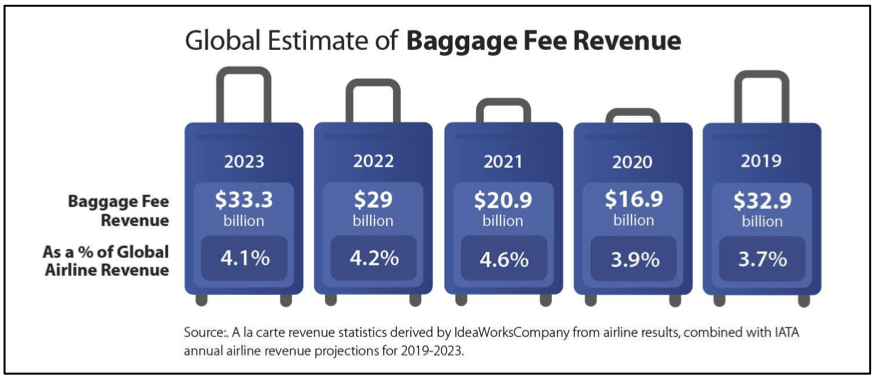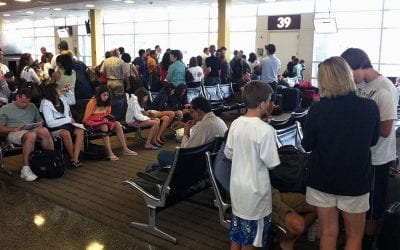The normal increased round-trip airlines baggage fees now cost between $70 and $80 per checked bag.

Many wondered why I was waiting to see whether I covered the baggage fees increases. I was waiting for the last shoe to drop. On Tuesday it fell, as Delta followed American and United movements to higher baggage fees. Today, “normal” round-trip baggage fees will cost between $70 and $80. That’s on top of the highest airfares passengers have seen in a long time.
The free bag included with most airline credit cards seems to have been maintained. This makes sense, since most of the airlines’ profits come from credit card fees. Plus, the major airlines have the largest credit card deals and the most to gain.
USA Today says airlines are playing a tax game, since the taxes on flight charges are higher than those on fees collected.
Plane tickets – and anything the ticket includes – are subject to a 7.5% excise tax, Keyes said, but that tax excludes optional fees. “So, in some ways, it’s quite a bit more efficient for airlines from a tax perspective to be unbundling,” he said.
Only Southwest Airlines has maintained its “bags fly free” widely advertised difference.
Alaska Airlines earlier raised their baggage fees to $35 for the first bag and $45 for a second. JetBlue started charging $45 to check a bag with a discount of $10 if the fee is paid at least 24 hours in advance, Other airlines announced their responses to the network carriers baggage fee increases on their websites. International baggage fees will increase to mirror domestic without the discounts.
Most airlines baggage fees have remained stable since they were raised in 2018. However, in 2020 United and JetBlue increased fees for checked baggage paid at the airport but allowed passengers to pay in advance to avoid the increased fees.
The Wall Street Journal noted that most airlines claimed that their increases are a result of inflation in wages and fuel.
Without extra credit card fees, seat reservation fees, and baggage fees, the airlines would lose money.
According to IdeaWorksCompany:
“Frequent flyer and commission-based” is the other component of the $117.9 billion ancillary revenue estimate for 2023. It includes commissions on accommodations, car rentals, travel insurance, and more. The table below lists how the $39.8 billion is spread across the world. Not surprisingly, US major airlines dominate due to the large co-branded credit card portfolios. Frequent flyer programs typically account for more than 90 percent of the global frequent flyer and commission category.
Without the credit card income generated by the frequent flyer programs, the airlines would lose money every year. All of the extra fees mean extra income for all airlines.
In 2022, collected global baggage fees increased 39 percent among the top 20 international airlines. Each year IdeaWorksCompany analyzes the ancillary revenue disclosures for airlines all over the world. These results are applied to a larger list of carriers (which numbered 122 for 2022) to estimate ancillary revenue activity for the world’s airlines. Baggage activity for each category of airline is added to this analysis to calculate a global estimate. It’s a significant component of ancillary revenue and consists of three primary sources: checked baggage in the aircraft hold, added fees for heavy and extra-large bags, and for some airlines, the price charged for larger carry-on bags.
Consumers have reacted to bag fees by wanting to carry more bags into the cabin to avoid charges. Travelers love the convenience of carry-ons, and even load up the cabin on airlines that don’t charge for checked bags. For all airlines, from global network carriers to LCCs, this has become an operational challenge and customer pain point. Many carriers limit carry-ons to 7kgs (15 pounds) and allow an additional personal item such as a purse or laptop bag that can fit under the seat.
The bottom line is that low airfares come with extra fees. Make sure to add in all the fees before you buy the cheap airfare.
READ ALSO:
How to not be deceived by airline seating hanky-panky
Why AA’s new mileage program changes are VERY bad for travelers

Charlie Leocha is the President of Travelers United. He has been working in Washington, DC, for the past 14 years with Congress, the Department of Transportation, and industry stakeholders on travel issues. He was the first consumer representative to the Advisory Committee for Aviation Consumer Protections appointed by the Secretary of Transportation from 2012 through 2018.





